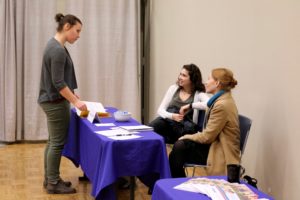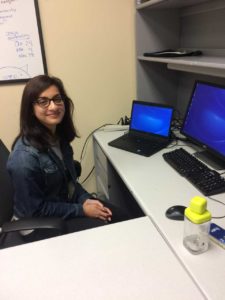Upon applying for the Engaged Citizen Corps, I was under the impression that it would be like any other form of service I had done throughout my lifetime- direct and short-term contact with whomever I was serving. Little did I know that being a part of the ECC would cause me to reexamine the way I viewed myself and the service I do. In short, the ECC has not been what I initially expected. In reality, it has been a much more enriching and impactful experience. Through combining my academics with service, I have gained a deeper understanding of social issues (specifically homelessness) and how my actions impact others.
 As an Engaged Citizen Member, I have been paired with Iowa Homeless Youth Centers (IHYC), a non-profit that works to end the cycle of homeless and promote independence through assistance and support. IHYC works primarily with the ages of 16-22 with direct assistance in the areas of education, employment, safe housing, positive community engagement, and life skills. There are several programs instilled at IHYC in order to achieve the youth’s goals within the said areas including the Youth Opportunity Center, Post-Secondary Education Retention Program (aka PSERP), counseling, Street Outreach, and Emergency Beds. The Youth Opportunity Center is a safe-space where youth can have a warm meal, use computers, socialize with others, and relax. Meanwhile, PSERP works closely with the youth as a form of support while achieving a higher education. Several of the youth utilize the counselor, while even more participate in Street Outreach, a program in which every other weekend, members and volunteers of IHYC bring survival packs to people experiencing homeless. Finally, the Emergency Beds are available for up to 10 youth, in which they can reside for a short amount of time while they work with IHYC’s staff to figure out their next steps. Needless to say, IHYC is dedicated to helping the youth reach a level of self-sufficiency.
As an Engaged Citizen Member, I have been paired with Iowa Homeless Youth Centers (IHYC), a non-profit that works to end the cycle of homeless and promote independence through assistance and support. IHYC works primarily with the ages of 16-22 with direct assistance in the areas of education, employment, safe housing, positive community engagement, and life skills. There are several programs instilled at IHYC in order to achieve the youth’s goals within the said areas including the Youth Opportunity Center, Post-Secondary Education Retention Program (aka PSERP), counseling, Street Outreach, and Emergency Beds. The Youth Opportunity Center is a safe-space where youth can have a warm meal, use computers, socialize with others, and relax. Meanwhile, PSERP works closely with the youth as a form of support while achieving a higher education. Several of the youth utilize the counselor, while even more participate in Street Outreach, a program in which every other weekend, members and volunteers of IHYC bring survival packs to people experiencing homeless. Finally, the Emergency Beds are available for up to 10 youth, in which they can reside for a short amount of time while they work with IHYC’s staff to figure out their next steps. Needless to say, IHYC is dedicated to helping the youth reach a level of self-sufficiency.
As an ECC member, I work closely with Taylor McKee, the Development Coordinator and Emma Christianson, the Development Director. My main responsibilities at IHYC include helping organize special events. I am also responsible for revamping IHYC’s presence on social media and occasionally interviewing youth or staff members for the IHYC’s newsletter. During my time thus far at IHYC, I have gained a better understanding of the inner workings of non-profits and the amount of thought and work that goes into every aspect of the programs. More importantly, I have become more educated on the social issue of homelessness and now feel as though I have a greater understanding of how I can act as an advocate. All in all, this year has been a very humbling and eye-opening experience.
As a part of the ECC’s service-learning component, I took a class called the Common Good with my fellow ECC members. While this class was not what I was expecting, it caused me to reexamine my preconceived notions about service. Essentially, we read and discussed Toxic Charity by Robert Lupton, a book that enforced the idea that service often hurts and disadvantages the ones it aims to help. Initially, this message seemed rather taboo and cynical. However, after further analyzing Lupton’s message, I was able to acknowledge the root of his message. Too often in the field of service, aid is given without fully examining what actually needs to be done and how it will affect those being served in the long run. Additionally, some service provides too much assistance that it leads to dependency, which in turn creates and perpetuates a cycle. In contrast, IHYC believes that the only way to break the cycle of homelessness is through promoting self-sufficiency among the youth. Through doing so, the youth are able to take accountability for the progress and their future plans. I have seen first hand how thrilled and proud the youth are when they complete a major task or milestone. After seeing the impact that IHYC’s tactic had on the youth, I was able to better understand Lupton’s message and its implications.
While I have had many wonderful experiences during my time in the ECC and IHYC, I am most grateful for the level of social awareness the programs have given me. Before this year, I considered myself a knowledgeable and socially-conscious member of society. However, I now have a better understanding of the causes and social construct of homelessness than I did before entering this program. Our society has a habit of ignoring topics or issues that make us uncomfortable or don’t directly affect us. This is a major flaw as it only perpetuates the issue. Thus, I’ve realized that advocacy can start small. In fact, change can start from simply realizing there is an injustice. For example, several times throughout the year I have found myself acknowledging stereotypes our society has on a day to day basis. I have also become more self-aware of my privilege. More specifically, I have realized that while I cannot control the fact that I am a privileged individual, I can control how I use my privilege. For example, I have used my privilege of going to Drake to promote change and advocate for others through serving as a member of the ECC.
It is amazing to think that I have gained so much experience and awareness just through simply applying to the ECC. Drake University and the ECC have exceeded my expectations and made my first year of college an enriching and unique experience, and for that I am thankful. As my year draws to a close, I am saddened to think that my time as an ECC and IHYC member are almost over. However, I know that my journey to becoming a better advocate has only started and has been greatly aided by my experiences provided by the ECC.
Written by: Ashlie Bunten
 These “livelihoods” that I describe are often wrongly stereotyped especially within Anawim’s tenant basis. Though these people may be experiencing drug addictions, alcoholism, single parenthood, etc., they are not lazy, helpless scum. They are just people who have been bogged down by society’s unequal distribution of resources. With a deepening gap between the haves and the have nots, they feel the inescapable burden the most. Non-profits like Anawim are designed to provide opportunities to those who might not otherwise get the chance. But, it is important to note, that even Anawim’s programs do not extend to everyone. These man-made boundaries put people at risk for an on-going cycle of self-hatred and frustration. I regret to say that it is this that results in giving up. In doing so, people experiencing homelessness accept the wrongly attributed labels and become what they are described. This is not their fault. It is ours – for not speaking up or changing our language (one of the most powerful tools we have).
These “livelihoods” that I describe are often wrongly stereotyped especially within Anawim’s tenant basis. Though these people may be experiencing drug addictions, alcoholism, single parenthood, etc., they are not lazy, helpless scum. They are just people who have been bogged down by society’s unequal distribution of resources. With a deepening gap between the haves and the have nots, they feel the inescapable burden the most. Non-profits like Anawim are designed to provide opportunities to those who might not otherwise get the chance. But, it is important to note, that even Anawim’s programs do not extend to everyone. These man-made boundaries put people at risk for an on-going cycle of self-hatred and frustration. I regret to say that it is this that results in giving up. In doing so, people experiencing homelessness accept the wrongly attributed labels and become what they are described. This is not their fault. It is ours – for not speaking up or changing our language (one of the most powerful tools we have). Hello, my name is Sabrina Uddin and I am a first year student at Drake University from the Chicago area. As a member of the
Hello, my name is Sabrina Uddin and I am a first year student at Drake University from the Chicago area. As a member of the